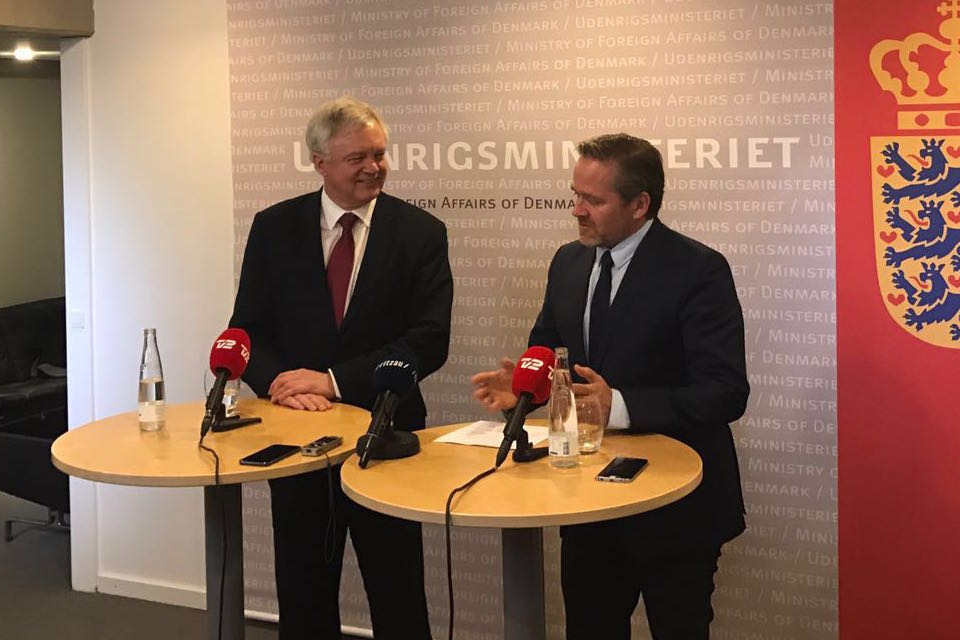'A new chapter in UK-Denmark relations'
Secretary of State for Exiting the European Union, David Davis, writes in Politiken ahead of his meeting with Denmark's Foreign Minister, Anders Samuelsen, in Copenhagen.

In less than thirty days, the UK intends to have begun its exit negotiations with the EU — marking the start of a new chapter in its relationships with both the union itself and each of the 27 member states.
But as I visit Copenhagen today, on my first visit to Denmark as the UK Secretary of State for Exiting the EU, I come with a clear message.
While Britain is leaving the European Union, it is not turning its back on Europe or on Denmark.
Together, we enjoy a strong and unwavering alliance, independent of our membership of the EU.
Our forces have operated side by side in Afghanistan, Iraq and Syria, while as members of NATO we are now working closely to provide support to our allies in Eastern Europe.
Trade between our two nations is also hugely important, at over £10 billion a year.
And Danish culture can be seen in all parts of British life. Television dramas like Borgen and The Bridge are screened on the BBC, our children play endlessly with Lego and ‘hygge’ is the new buzzword for coffee shops and eateries across the UK.
So as Britain leaves the EU, the relationship between our two nations will continue to thrive, not least because of the shared interests we have in this globalised world.
As threats to European security become more acute, it is critical that we continue to foster the powerful alliances that we hold across Europe. The UK will not renege on its responsibilities in keeping our continent safe.
We will also, of course, continue to trade with EU nations. The UK Prime Minister has made clear her determination to build a truly Global Britain and in doing so, we will pursue a bold and ambitious Free Trade Agreement with the European Union.
It should be one that works for both the EU and Britain. One of my key messages here will be that it is in the UK’s interest that the EU prospers politically and economically, so we want to reach an agreement about our future relationship that is in the mutual interests of both sides.
Our aim is for arrangements that allow for the freest possible trade in goods and services between Britain and the EU’s member states.
That gives British companies the maximum freedom to trade with the Danish markets, and lets Danish businesses do the same in Britain.
Because we want to preserve and build on the strong trading relationship between our two nations — and protect the £70 billion worth of investment that Danish companies have made on British shores.
That investment can be seen directly in our homes with DONG Energy producing enough renewable energy to power 4.4 million British houses.
The UK is also Denmark’s second largest partner in research within the EU. Over the next ten years, Denmark’s Novo Nordisk is set to invest £115 million in a new science research centre in Oxford, underlining the esteem that our two science communities hold each other in.
And Britain has backed Denmark – with Shell, Debenhams, and GlaxoSmithKline being just three of the hundreds of businesses that have chosen to locate in your country, employing 25.500 people.
This trade and investment between our nations will continue when the UK is outside of the EU. As will the affection our citizens hold for each other - one which brings Danish tourists to Britain and attracts British tourists to Denmark.
It has also encouraged many to stay for much longer than a holiday.
So one of the top priorities we have going into Brexit negotiations is to get an agreement to secure the status of EU nationals living in the UK, and Brits living in the EU as soon as possible.
There are 30,000 Danes who have made the UK their home, and 18,000 Brits have done the same in Denmark.
We would have liked to have reached an agreement with the EU about their status already.
It’s only fair that those who have built lives for themselves abroad, and who are contributing to foreign economies and societies, see their status secured as soon as possible.
The approach that we take on this issue – one of reasoned goodwill to secure mutual benefit – is the one that we will adopt throughout the EU exit negotiation process.
Because we enter these negotiations as friends, and we want to conclude them as friends – friends who are working together to deliver security and prosperity across our continent.